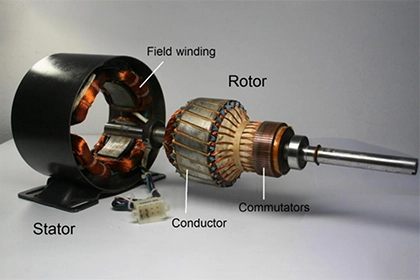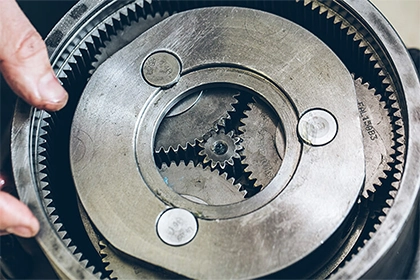
The difference between AC and DC motors and their advantages and disadvantages
AC motors and DC motors are both types of motors commonly used in industrial production, but they are different in motor structure and power supply methods.
In this article, we will introduce the difference between AC motors and DC motors in detail, as well as their respective advantages and disadvantages, and hope to bring you more help in understanding the AC and DC motors.
The difference between AC and DC motors
The motor structures of AC motors and DC motors are different
- AC motors use alternating current, only stator coils, according to the phase layout, naturally generate a rotating magnetic field.
- A DC motor, through the DC current, will not directly produce a rotating magnetic field, it relies on the rotor rotating commutator at any time to change the direction of the current into the rotor so that the rotor and stator are reversed so that the rotor can rotate.
Different working principles
AC motor: when the motor's three-phase stator windings (each with a difference of 120 degrees electrical angle), into the three-phase alternating current, will produce a rotating magnetic field, the rotating magnetic field cutting rotor windings, thus generating an induced current in the rotor windings (the rotor windings are a closed circuit), the current-carrying rotor conductor in the stator rotating magnetic field will produce an electromagnetic force, which will form an electromagnetic torque on the rotor shaft of the motor, to drive the motor. The direction of rotation of the motor is the same as the direction of the rotating magnetic field.
DC motors: DC motors utilize the magnetic field generated by a DC power source to generate rotational power by changing the direction of the current, including DC motors and brushed DC motors.
Maintenance and cost
- AC motors usually have a longer service life and lower maintenance costs.
- DC Motors can be more costly to maintain due to their more complex control systems.
Advantages and disadvantages of AC and DC motors
Advantages and disadvantages of AC motors
Advantages
- Simple and easy to design
- Good power factor
- Inexpensive
- Remote control and automatic regulation can be realized, thus automating the production process
- Good power-to-weight ratio
- Low maintenance costs
Disadvantages
- Full-voltage direct starting has a large impact on the power grid.
- Speed control requires the use of a frequency converter.
Advantages and disadvantages of DC motors
Advantages
- Accurate speed control and fast response make it suitable for occasions with high speed requirements.
- The starting current is small, and the impact on the power grid is relatively small.
- The excitation current and armature current of a DC motor are relatively independent, which is convenient to control.
- DC motor excitation magnetic field and armature magnetic field are perpendicular to the AC motor magnetic field is induced, it is not convenient to control, now do the vector control, torque control is to find ways to convert the AC motor to the direction of the control of the DC motor.
Disadvantages
- The control system is more complicated, and the cost is higher.
- Due to the large number of components, the failure rate is relatively high, and the maintenance cost will also increase.
Conclusion
In summary, AC motors and DC motors each have their own applicable scenarios and characteristics. When selecting a motor, a reasonable choice should be made according to the specific application and requirements in order to achieve the best working effect and economic benefits.



Leave a Comment